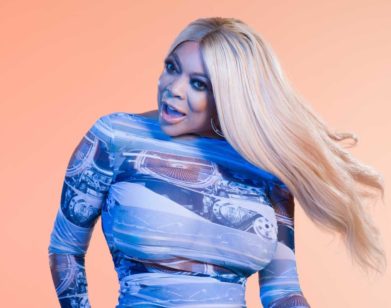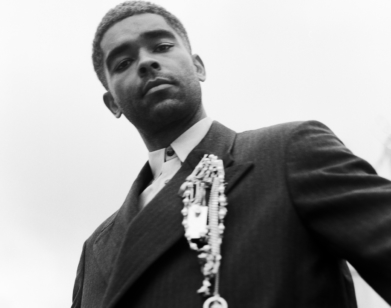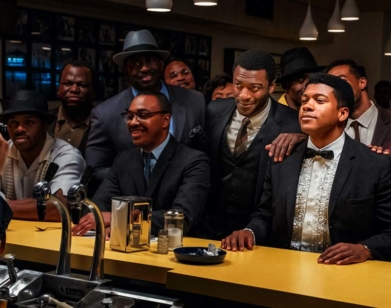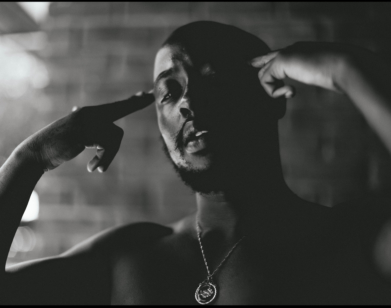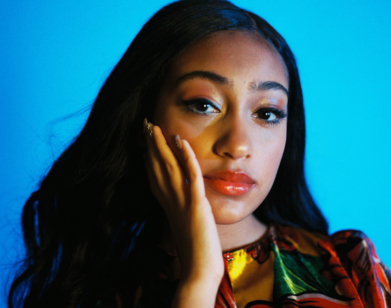IN CONVERSATION
Meagan Good and Tamara Bass on the Trials and Tribulations of Making a Movie

Photo by Cécile Boko.
In the land of Hollywood, Meagan Good has lived many lives. She first graced our screens in 1991 in television shows like Gabriel’s Fire and Pacific Blue before landing her breakout role as Cicely Batiste in 1997’s Eve’s Bayou, alongside Jurnee Smollett and Samuel L. Jackson. Since then, she has made multiple transitions, from child star to music video vixen to girl-next-door, though she is only just beginning to show her full capabilities as a risk-taking artist. In the mid-2000s, she starred in hit movies and cult classics alike, appearing in D.E.B.S, Roll Bounce, Waist Deep, and Stomp the Yard. Though she was getting older, Good was still being cast as teenagers well through her 20s. So, like most women who want to shed the old and become the new, she changed her hair. Good’s pixie cut marked a turning point in her career, and her films began to reflect that maturity and growth. Movies like Jumping the Broom, Think Like A Man, and A Boy. A Girl. A Dream. showed the world that she could do comedy and, as she calls it, “go deep.”
For an actress that is constantly shapeshifting, the decision to direct seems like a logical next step. Good’s latest endeavor, If Not Now, When?, is her directorial debut. Released earlier this year, the drama tells the story of four high school friends as their relationship is drastically tested by one event, showing their ever-changing dynamic as they enter into adulthood. Good stars as Tyra, the young mother of Jillian (Lexi Underwood), who suffers from opioid addiction. It’s a project that fully cements Good as a multi-hyphenate talent willing to take risks. To celebrate the release of her film, Good hopped on the phone with her co-director and friend, Tamara Bass, to discuss their acting inspirations, the woes of getting a movie made, and the importance of maintaining integrity. —JULIANA UKIOMOGBE
———
MEAGAN GOOD: So, Tam, let me see. Which iconic Black woman inspires you the most and why?
TAMARA BASS: Regina King is everything to me. She is everything that I aspire to be and she carries herself with such grace and integrity. If I see her out, it’s nothing but love. And then on top of that, she’s just killing every facet of her career. So I think she inspires me the most. Okay, back to you. Who inspires you the most?
GOOD: Growing up, Halle Berry inspired me the most because I didn’t have a lot of examples of Black women where I grew up and she was someone that really stuck out to me. I obviously thought she was really beautiful, but as I followed her career, I saw her struggle. I think that people thought because she was so attractive that a lot of opportunities weren’t coming to her because people didn’t realize how talented she was and how much depth she had. Now she has her directorial debut this year as well. At 50-something-years-old, she’s a total badass.
BASS: Regina King and Nia Long were my versions of Halle Berry. Growing up, the standard of beauty was always the biracial girls, or the “good hair” girls. I was like, “Well, who looks like me? Who looks like the regular brown skin girl?”
GOOD: You and I have both had conversations about our experiences in the industry and some of the things that have worked for us and some of the things that have really worked against us. What are some of the life lessons that you’ve learned in your time in the industry that empowered you?
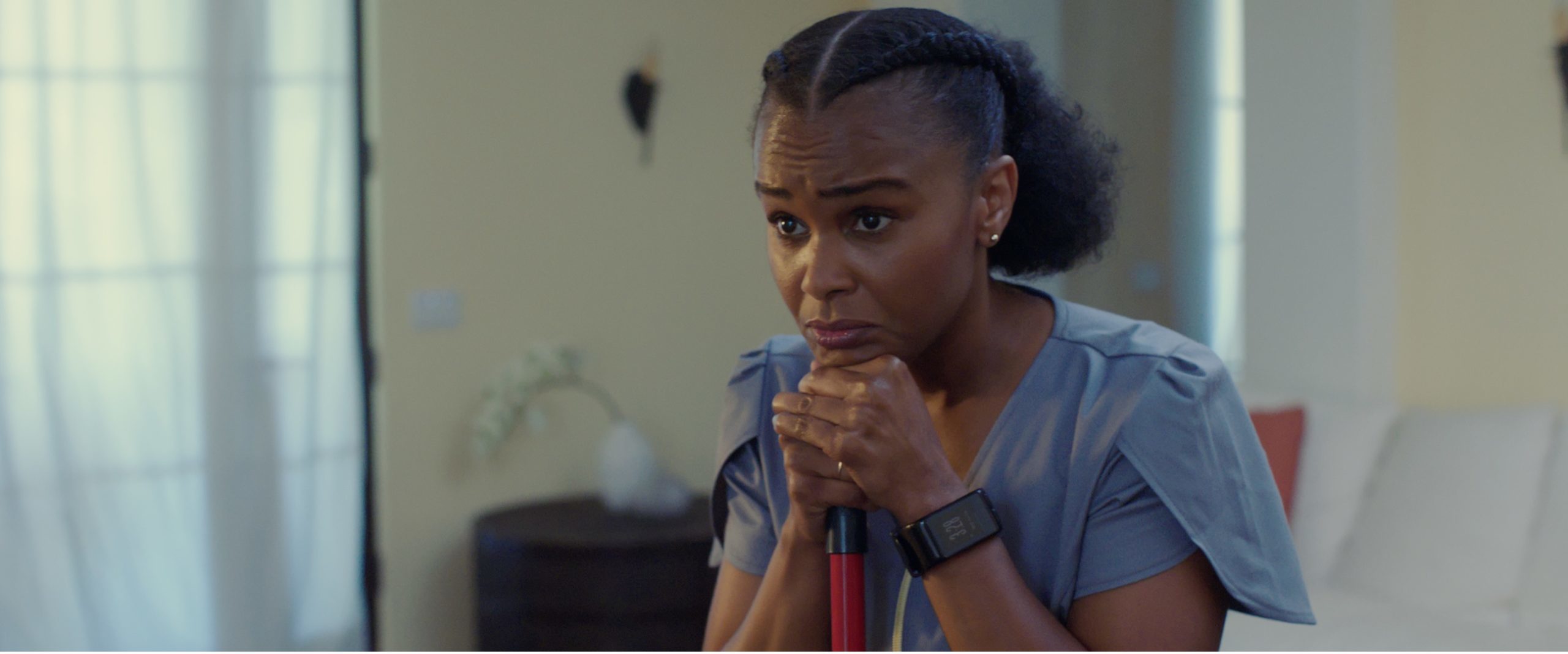
Tamara Bass as Patrice in If Not Now, When? Photos courtesy of Vertical Entertainment.
BASS: The biggest life lesson I learned is a by-product of the industry, but it wasn’t taught to me by the industry. I had to remind myself that I am enough. I spent my twenties being told of all the ways that I wasn’t. It had nothing to do with my talent. It was always some superficial thing. I’ve been told I wasn’t, excuse my language, fuckable. I wasn’t pretty enough, I wasn’t sexy enough. It broke me. What I had to learn was that I’m not just enough, but I’m more than enough. I am so surpassed. If you don’t see it, that’s on you. What you think of me no longer diminishes what I think of myself. God gave me these gifts, and he didn’t just give me one. He gave me a lot. So I don’t have to ask your permission anymore to be. Even us doing this movie was a way for me to say, “We don’t have to ask your permission to be what we are called to be. You’re either going to like it or you’re not going to like it, but I don’t need your permission to exist.” What’s the biggest lesson you’ve learned?
GOOD: Well, I can definitely relate to what you were saying. People thought, “Okay, well, she’s very attractive, but she’s probably not very talented or she probably can’t go very deep.” There was a time when I was fighting to make that transition from child actor, and I was 22 in Roll Bounce playing 16. I was like, “You guys, I am a young woman and I want to make the transition.” I struggled. So what I did was I started being really intentional about the choices that I made. Around the time that I did Biker Boyz and the “21 Questions” [50 Cent] video, I became this sexy vixen. But then that’s all that anybody ever saw me as. So I wouldn’t even get the opportunity to go into the rooms for certain things. There would be a preconceived notion of who I was based on the only characters that were afforded to me. I struggled with that all through my twenties, and it wasn’t until I was almost 30 and I chopped off my hair, that I tried to divorce myself of that particular look. That’s what brought me to TV. That’s why I decided to do Deception, because I was like, “How do I get people to really see me differently?”And I’m terrified to do TV because I hate big commitments. I’ll make a commitment, I’ll do it for the time, and then I want to move on to the next thing and be a free spirit.
BASS: Oh, I remember all of those. We had those extensive conversations about what it is that you wanted to do, and I remember the struggle of you being labeled as just pretty. Up until If Not Now, When?, my favorite performance by you was Miles from Home. I knew it was aligned with what you wanted to do. I would say, out of all of the characters you’ve played, it’s probably the one closest to who you are: very whimsical, floaty, hippy. It was refreshing because up until that point, we had seen you do the same thing. I can remember distinct conversations and sitting down debating with you because you did not want to do Stomp The Yard. I mean, we would sit on the phone for hours of you trying to talk yourself into it. And then you were like, “I don’t want to keep doing the same thing. How do we get out of this?” And that’s when I brought you Sundays in Fort Greene.
GOOD: I remember those conversations we had. Ultimately I did it, and it was a great move and choice for me. Then I remember with Sundays in Fort Greene, I didn’t even know that you were a writer. And obviously, we’ve known each other since we were 16 and 19 and that was the first thing that I read that you had written. That script was so beautiful and such a great character for me and we spent all those years trying to get it done. I think one thing we walked away with was the integrity of the film that we wanted to make. Then when it came down to getting the money and all these things, everyone started trying to change the quality and integrity of the script that you had created. I know it was traumatizing for you and it was upsetting for me, but I think that’s what made us so gung-ho about If Not Now, When? Like, “No, we’re not going to take the money. No, we’re not going to cut the script down. No, we’re not going to change the characters. This is the story we want to tell and we’re not going to make any adjustments for anybody. We’re going to put out the vision that we want.” I think that attitude was really born from the experience with Sundays in Fort Greene.
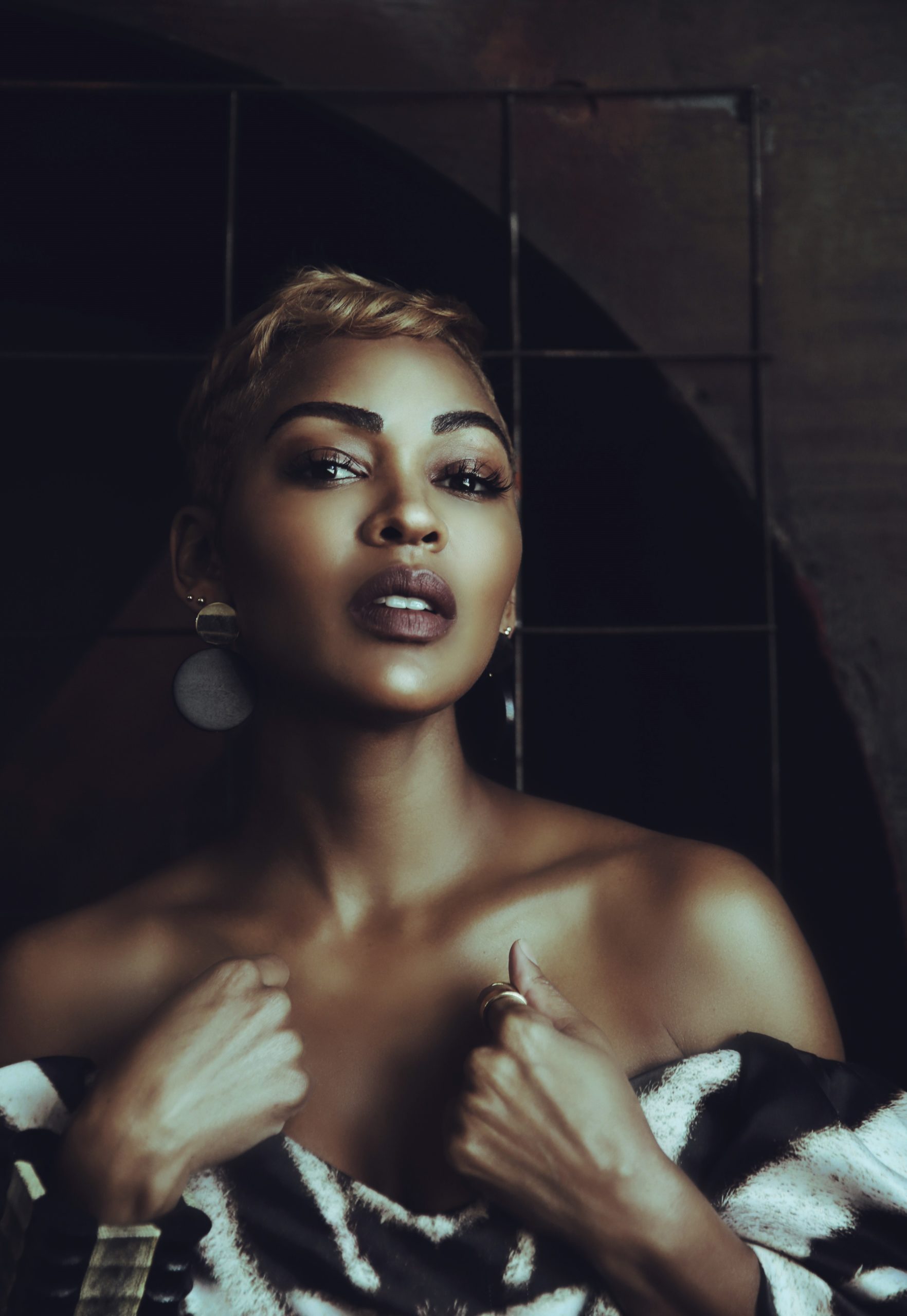
BASS: Oh my gosh, it was so traumatizing. When we started moving through the process with If Not Now, When?, I had to check my trauma, but we made it out.
GOOD: We made it out. I think it prepared us for this. And there was a lot of pushback from people who were like, “Just act, just focus on acting.” I need to create something that is intentional and is purposeful that I put into the world. That’s what I want to give to this generation. To me, it’s almost like artistic activism. It’s pouring into women and telling them they’re worthy and showing something that’s about sisterhood and love. “Oh, you work and you make money”—that’s not enough. I need to be purposeful.
BASS: As we get older, our wants and needs evolve and they change, and what feeds us evolves and changes. I think it also goes back to you being the pretty face. They were so comfortable with selling you as the pretty face, despite the fact that you’re protesting vehemently against that. Through this process, I was proud that we stuck with what we set out to do. Financially, I was in not the position to say no to anything, but I also knew that I had to go to bed with myself every night. I had to look up in the mirror every single morning and face Tamara. So I couldn’t face Tamara knowing that I sold out for a dollar. I grew up broke, so being financially unstable does not scare me. What scares me is not having integrity. Those are things that are intangible that I don’t know if the 20- and 23-year-old versions of Tamara and Meagan would have been able to comprehend, but the 42- and 39-year-old versions of Meagan and Tamara absolutely get.
GOOD: I think we may not have been able to comprehend it, but I think we would have stuck to our guns because we both knew that bad situation. And, like I said, I’m really thankful for that because it was the thing that sustained us throughout this entire process. So I want to ask you, what is the thing that you can do, that nobody knows that you can do, that you want to show people through your art?
BASS: I actually am funny. The industry only knows me as the dramatic girl, but my close ones know that I’m sarcastic as hell and I make people laugh all the time without trying. So I think I want to show that. The pilot that I’m currently pitching now gets to show that side of me. I’m excited about that. Okay, your turn.
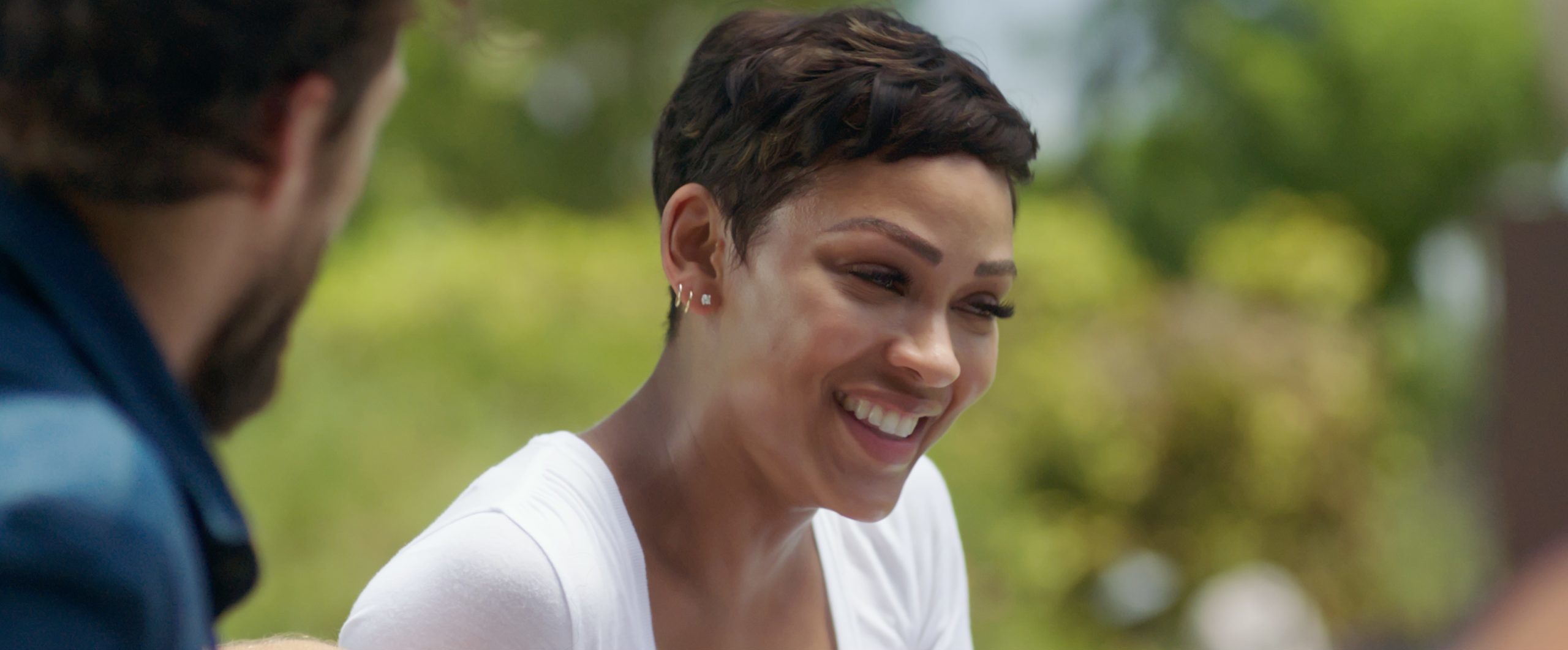
Meagan Good as Tyra in If Not Now, When?
GOOD: That’s a hard question for me because I think for a long time, I just wanted to show people that I could do drama, and that was when I was really young. Then Eve’s Bayou happened, and I’ve been hoping for something like that for years since I was 10. For a long time, I wanted to tackle comedy because it terrified me. The first time I actually really felt comfortable was in the first Think Like A Man, but it’s still something that terrifies me. With the show that I’m doing now, I called Regina Hall and I was like, “To me, you are one of the best to ever do it. Not just as a comedic actor, but as a fully-formed actress that can do everything.” I had her coach me for my casting. Before we started it, she was like, “Girl, I watched Love by the 10th Date. You are funny. Just trust yourself and trust your instincts. They’re uniquely yours and it’s uniquely your comedy, so go for it.” So I want to continue to grow in that space. Now, I think that the biggest challenge for me would be doing a biopic. I don’t know whose, but I think when you’re not creating a character, but you’re actually living and breathing someone else who has already lived and breathed, that is probably one of the biggest challenges. I loved the interview that Chadwick [Boseman] did where he talked about doing James Brown. To hear how terrified he was and how skeptical and unsure he was if he was doing a good job, it really encouraged me to realize that even some of the greatest people who have done some of the greatest portrayals are still afraid. That’s really encouraging to me, so that’s what I would like to do.

